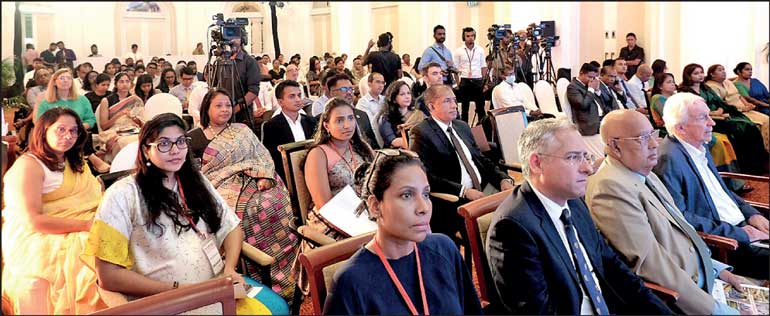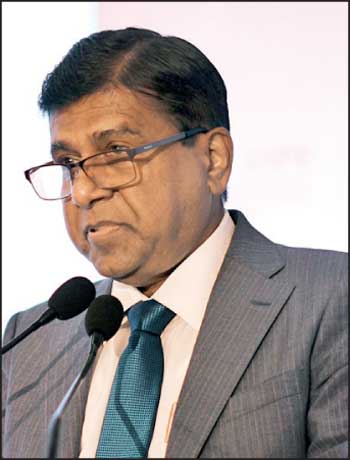Monday Feb 23, 2026
Monday Feb 23, 2026
Saturday, 23 March 2024 00:04 - - {{hitsCtrl.values.hits}}




 Sri Lankan businesses must look beyond the surface to design Diversity, Equity and Inclusion (DEI) strategies that consider broader complexities, if they are to achieve tangible and transformative business results and greater social harmony, says a new landmark report that provides recommendations for businesses to harness the potential of DEI.
Sri Lankan businesses must look beyond the surface to design Diversity, Equity and Inclusion (DEI) strategies that consider broader complexities, if they are to achieve tangible and transformative business results and greater social harmony, says a new landmark report that provides recommendations for businesses to harness the potential of DEI.
The new report “Unlocking the Power of DEI: Diversity, Equity, and Inclusion as a Strategic Imperative for Business Success and Social Harmony” was conducted by the European Chamber of Commerce of Sri Lanka (ECCSL) in partnership with the Strengthening Social Cohesion and Peace in Sri Lanka (SCOPE) program which is co-funded by the European Union and German Federal Foreign Office. The study is an exploratory exercise based on an extensive literature review and interviews with 41 diverse businesses in all nine provinces of Sri Lanka. The study and dialogue at the event aimed to shed light on best practices and how businesses can leverage on existing know-how to grow their business potential in modern markets.
The study aligns with the Government’s new Strategy to Promote Inclusive and Sustainable Businesses to Achieve the Sustainable Development Goals in Sri Lanka (ISB Strategy), which was also presented at the event by Sustainable Development Council Director General and CEO Chamindry Saparamadu.
The study was officially presented to the Justice, Prisons Affairs and Constitutional Reforms Minister Wijeyadasa Rajapakshe and Foreign Affairs Minister Ali Sabry, as well as EU Delegation Ambassador Carmen Moreno. The event was also attended by a cross section of Sri Lanka’s businesses as well as Government, non-Government and international development representatives involved in supporting inclusive economic growth in Sri Lanka.
Speaking at the event, Ambassador Carmen Moreno emphasised that “We must all play a part in promoting inclusion and equality. Governments and the public sector must adopt and implement the necessary legislation and public policies to combat all forms of discrimination and promote social justice. But also, the private sector has an essential role to play in building social cohesion and inclusion, starting at the workplace.”
She further stated, “Improving business performance is an imperative at a time of crisis, and the report presented today shows clearly the linkages between economic growth, inclusiveness and social justice and the opportunities for businesses in Sri Lanka to embrace diversity and contribute to build a more resilient and prosperous society.”
The findings highlighted the business case for long-term planning, broad input, and ongoing evaluation of DEI strategies, which could in turn generate significant commercial advantages including reduced personnel costs, improved resource acquisition, more effective marketing, and enhanced organisational agility.
In his address, Foreign Affairs Minister Ali Sabry stated that the reason the Government remains dedicated to advancing social cohesion is not only because of the social and moral imperative but also its advantage for national development. He stated that for this purpose, “The Government of Sri Lanka is committed to enhancing our engagement with the international community, as global partnerships are crucial for achieving progress in both social cohesion and economic recovery.”
“The private sector has an important role to play to achieve Sri Lanka’s sustainable development goals. This initiative highlights the interconnections between social justice and economic development,” stated Justice, Prison Affairs and Constitutional Reforms Minister Wijeyadasa Rajapakshe. “We are appreciative of this long-standing cooperation with the European Union and Germany, including in this initiative with our ministry. The synergy between a robust justice system, reconciliation and economic prosperity cannot be overstated. By ensuring fairness, equity and legal certainty, we can continue to lay the necessary groundwork through the ministry for fostering both peace and business growth.” With Sri Lankan businesses facing challenging economic conditions, the report and panel discussion underscored the commercial benefits of making DEI a key component of their long-term strategy and business DNA. “This is an effort to explore the business case for diversity, equity and inclusion and its potential to foster societal harmony and mutual understanding, providing a compelling argument for businesses to integrate DEI into their core strategy,” said ECCSL
Inclusive Business Practices Project Lead William Baxter.